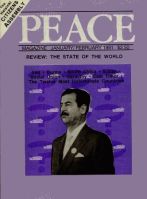
Peace Magazine Jan-Feb 1991, page 5. Some rights reserved.
Search for other articles by Hans Sinn here
WHILE Germany was in the first days of its reunited existence, I came to Berlin to visit Herbert Ammon, who, with Peter Brandt, had long challenged the prevailing Left view that the German division was good for the German soul and the stability of Europe.
One day, after Herbert and I spoke on Radio Berlin (East), the producer took us on a tour of the stark and forbidding former State Security Police (Stasi) headquarters. Here are stored the files which the Stasi collected on six million East Germans and two-and-a-half million West Germans. We exchanged sympathetic views with the demonstrators whose tent camp blocks the gates to the complex. They want to prevent the incriminating files from being destroyed by anxious East and West German politicians whose lives the Stasi had painstakingly monitored.
The producer was about to lose his job. Radio Berlin (East) is to be closed. Like most other East German institutions, its function-though not its staff-will be taken over by a more efficient West German enterprise. Another sign of the times: Our radio host's boss, formerly in charge of preserving the station's Marxist-Leninist orthodoxy, is now looking after the adjustment of former East German radio personnel to the new Western ways.
Around the corner, East German products were sold at an open air market at bargain basement prices. The East Germans were helping to demolish their economy by boycotting their own goods, including food, in favor of Western products. We bought three bottles of Hungarian wine for five D-Marks-$1.15 each. Herbert gave one bottle to the protesters in front of the Stasi to cheer them along.
During the next week, crossing and re-crossing from East to West Berlin required-since I had never known the city as a whole-constant readjustment of my image of the place. Distances have changed. The formerly inaccessible Check Point Charlie has become directly accessible, but it is not always clear how and where. Many, but not all, of the old roads, subway, and bus routes have reopened.
THE "HOUSE OF Democracy," headquarters for the various East German citizens movements, was still a hive of activity. The scene in the five-storey building is familiar to any peace or human rights activist: offices, posters, flyers, typewriters, newspapers, meetings, and conversation. Little has changed since March. There is an infusion of money from the West German Greens. However, since the West German Left neither wanted, anticipated, nor planned German unity it is doubtful that its influence on the East German citizens movement is beneficial. Most political activity is determined by such obvious needs as settling ownership questions, restructuring the economy, cleaning up the environment, and overhauling the educational system. The money and skills for this renovation come from the West. Bonn directs the flow of money. There is not much room for ideology.
As the economy of East Germany is being overhauled, the 85,000 guest workers from Asia and Africa are being asked to leave. People from Vietnam, Mozambique, Cuba, and Angola are losing the opportunity to work on contract at East German wages and to send home bicycles, radios, and sewing machines.
While the former East Germany is sending its guest workers home, West Germany in 1989 alone accepted 750,000 newcomers from various parts of the globe, including the GDR. By the end of 1990, the FRG will have absorbed another 400,000 newcomers. A growing public resentment is noticeable toward the continuing influx of newcomers, but there is no end in sight. Continuing war, environmental disasters, and overpopulation are causing the global refugee stream of 14 million people to increase steadily instead of diminish. The disintegration of the Soviet Union alone is expected to create two million refugees, moving westward first into Poland and then on across Poland's western borders.
West German economic and political managers are looking on with satisfaction while the early GDR opposition leaders, Protestant pastors, and other political dilettantes are being replaced by professionals like themselves. I expect, though, that the habits of careful thought and action which the East German Democratic Opposition acquired will assure them of a position of relevance in the united Germany.

Peace Magazine Jan-Feb 1991, page 5. Some rights reserved.
Search for other articles by Hans Sinn here